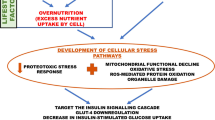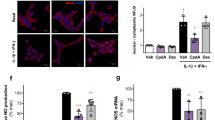Abstract
The role of two heat shock proteins, Hsp70 and Hsp90α, on stress response in mice with severe diabetes mellitus induced by a high dose of alloxan (500 mg/kg body weight), as well as in RIN-m5F β cells cultured in the presence of cytokines (IL-1 and TNF-α) was studied. Our results showed that severe type 1 diabetes mellitus (T1D) caused a higher expression of Hsp90α, but not Hsp70. Moreover, injections of the peroxiredoxin 6 antioxidant enzyme (PRDX6) did not affect the expression of these chaperones. Conversely, pro-inflammatory cytokines added to β-cells caused a significant increase in the expression of Hsp90α and, substantially, Hsp70. Moreover, cells cultivated in the presence of PRDX6 were more susceptible to the cytokine effect. Thus, in the course of severe alloxan-induced T1D, no protective role of the heat shock proteins, was revealed, and their expression level was not increased by PRDX6. At the same time the protective potential of these proteins was shown in vitro with the use of RIN-m5F β cells. Thus, the system of heat shock proteins was unable to prevent the devastating effects of severe T1D accompanied by high animal mortality.


Similar content being viewed by others
REFERENCES
Soedamah-Muthu, S.S., Fuller, J.H., Mulnier, H.E., et al., Diabetes Care, 2006, vol. 29, no. 4, pp. 798–804. DOI: . dc05-1433https://doi.org/10.2337/diacare.29.04.06
Tran, B., Oliver, S., Rosa, J., et al., Exp. Diabetes Res., 2012. https://doi.org/10.1155/2012/683680
Karunakaran, U. and Park, K.G., Diabetes Metab. J., 2013, vol. 37, no. 2, pp. 106–112. https://doi.org/10.4093/dmj.2013.37.2.106
Miki, A., Ricordi, C., Sakuma, Y., et al., PLoS One, 2018, vol. 13, no. 5, e0196570. https://doi.org/10.1371/journal.pone.0196570
Rojas, J., Bermudez, V., Palmar, J., et al., J. Diabetes Res., 2018, vol. 19. https://doi.org/10.1155/2018/9601801
Borges, T.J., Wieten, L., van Herwijnen, M.J., et al., Front. Immunol., 2012, vol. 3, p. 95. https://doi.org/10.3389/fimmu.2012.00095
Ocaña, G.J., Perez, L., Guindon, L., et al., Immunology, 2017, vol. 151, no. 2, pp. 198–210. https://doi.org/10.1111/imm.12723
Margulis, B.A., Sandler, S., Eizirik, D.L., et al., Diabetes, 1991, vol. 40, no. 11, pp. 1418–1422.
Bellmann, K., Wenz, A., Radons, J., et al., Clin. Invest., 1995, vol. 95, no. 6, pp. 2840–2845.
Novoselova, E.G., Glushkova, O.V., Parfenyuk, S.B., et al., Biokhimiya, 2019, vol. 84, no. 6, pp. 819–826. https://doi.org/10.1134/S0006297919060063
Novoselova, E.G., Khrenov, M.O., Parfenyuk, S.B., et al., Dokl. Biol. Sci., 2014, vol. 457, pp. 255–257. https://doi.org/10.1134/S0012496614040073
Wieten, L., Broere, F., van der Zee, R., et al., FEBS Lett., 2007, vol. 581, no. 19, pp. 3716–3722. https://doi.org/10.1016/j.febslet.2007.04.082
van Eden, W., Wick, G., Albani, S., et al., Ann. N. Y. Acad. Sci., 2007, vol. 1113, pp. 217–237. https://doi.org/10.1196/annals.1391.020
Novoselova, E.G., Glushkova, O.V., Lunin, S.M., et al., Int. Immunopharmacol., 2016, vol. 31, pp. 24–31. https://doi.org/10.1016/j.intimp.2015.11.007
Funding
This study was supported by the Russian Foundation for Basic Research (project nos. 18-04-00091 and 20-015-00216) and the Program of the Presidium of the Russian Academy of Sciences “Molecular and Cell Biology and Post-Genomic Technologies.”
Author information
Authors and Affiliations
Corresponding author
Ethics declarations
Conflict of interests. The authors declare that they have no conflict of interest.
Statement on the welfare of animals. All applicable international, national, and/or institutional guidelines for the care and use of animals were followed.
Additional information
Translated by A. Boutanaev
Rights and permissions
About this article
Cite this article
Novoselova, E.G., Glushkova, O.V., Khrenov, M.O. et al. Participation of Hsp70 and Hsp90α Heat Shock Proteins in Stress Response in the Course of Type 1 Diabetes Mellitus. Dokl Biol Sci 493, 124–127 (2020). https://doi.org/10.1134/S0012496620040079
Received:
Revised:
Accepted:
Published:
Issue Date:
DOI: https://doi.org/10.1134/S0012496620040079




